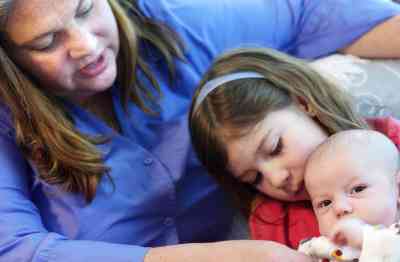And It's About Time There Was Some Support For Cushing's!
Jayne in the paper again!
 Jayne Kerns holds her daughter, Catherine, and son, Brian, at their
home in Spotsylvania County. Kerns is determined to raise awareness of
Cushing's disease, an uncommon hormonal disorder that often leads to
fatigue, weight gain, high blood pressure and other problems.
Jayne Kerns holds her daughter, Catherine, and son, Brian, at their
home in Spotsylvania County. Kerns is determined to raise awareness of
Cushing's disease, an uncommon hormonal disorder that often leads to
fatigue, weight gain, high blood pressure and other problems.
source: http://www.fredericksburg.com/News/FLS/2005/042005/04032005/1714998
April 3, 2005
By JANET MARSHALL
On the day her life changed for the better, Laura Zastrow was exhausted. So much so that she almost didn't go to the Quantico commissary, as she'd planned.
For years, Zastrow had felt run down without knowing why. One doctor chalked it up to depression. But that afternoon at Quantico, a stranger offered another diagnosis: Cushing's disease.
Rare and often misdiagnosed, Cushing's causes fatigue, weight gain, hair growth, mood swings, high blood pressure and other ills, all familiar to Zastrow.
The stranger, Jayne Kerns, recognized her own puffy face and hairy arms in Zastrow.
"I said, 'I feel like I'm looking in the mirror,'" Kerns said.
Kerns encouraged Zastrow to check out a Cushing's Web site, which Zastrow did. Every symptom listed matched her condition. Her doctor ran some tests, and the results confirmed Zastrow had Cushing's, a hormonal disorder often brought on by a tumor.
The chance meeting in September 2003 transformed Zastrow's life. In the months since, she's had surgery to remove a large tumor on her pituitary gland and rediscovered her old, healthier self.
"My energy is coming back," said Zastrow, of Locust Grove. "I've lost a lot of weight. I feel good. I don't feel like I'm in a fog anymore."
Kerns, of Spotsylvania County, has made it a mission to raise as much awareness as possible of Cushing's since being diagnosed with the disease in 2000. She's written President Bush asking him to declare a National Cushing's Awareness Day in April.
Her meeting with Zastrow was first described in a Free Lance-Star profile of Kerns in 2004. At the time, nobody yet knew just how life-altering that meeting would be.
It emboldened Kerns to keep reaching out to people she thinks have the disease. And it gave Zastrow hope for a healthier, more energetic future.
"I was at the point where I was deteriorating so fast that if Jayne wouldn't have approached me, I honestly don't know what would have happened," Zastrow said recently. "Obviously, I didn't know anything about [Cushing's], and neither did my doctors."
For those with the disease, April 8 is the unofficial day to recognize it and the man--Dr. Harvey Cushing--who first put a name to it.
People with Cushing's suffer from excessive levels of cortisol, the body's stress hormone. The condition can be caused by long-term use of certain drugs, such as prednisone for asthma.
Often, Cushing's stems from an overproduction of cortisol by the adrenal glands. The pituitary gland sometimes over-stimulates the adrenals, triggering the problem. Tumors on the adrenal or pituitary often are at the root of the problem, and treatment can involve removing the glands.
Kerns' diagnosis followed months of maddening efforts to pinpoint why her body deteriorated, and never recovered, after childbirth.
She said she was misdiagnosed many times, and that one doctor, frustrated by her recurrent problems, told her he no longer had time to listen to her and referred her to another physician.
Kerns ultimately had her adrenal glands removed.
Each year, 10 to 15 people out of every million are thought to be affected by Cushing's, making it highly uncommon.
"Doctors think that Cushing's is too rare for people to have it," Kerns said. "And I truly believe that it is not as rare as people think."
Another local woman, Jennifer Belokon of Fredericksburg, has Cushing's. She was serving in the Army in Iraq when she began feeling weak and gaining weight, adding 60 pounds in three months.
The Army flew her out of Iraq and sent her to Walter Reed Medical Center. After being diagnosed with Cushing's, she had her adrenal glands removed.
"Now, I have no adrenaline, no steroids or anything that will help me produce that second wind when doing anything," Belokon wrote in an e-mail.
Yet she's resumed exercising and is training to run the Rock 'n' Roll half-marathon in Virginia Beach in September. She ran a 10-mile race a few months ago.
"My time was nothing big," Belokon wrote. "But I was proud of myself for finishing."
Getting treated for Cushing's is life-altering, all three women said. Just finding out what's wrong is profound because a diagnosis often follows months or years of mysterious and unsettling ailments.
"It changes people's lives when they figure out what's going on," Kerns said. "It's kind of like discovering that you have diabetes, and then you get insulin. You find something that's going to make you feel better."
For more information on the disease and its symptoms, which include purple stretch marks, check out cushings-help.com
To reach JANET MARSHALL: 540/374-5527
jmarshall@freelancestar.com
Copyright 2005 The Free Lance-Star Publishing Company.
Jayne Kerns is a member of the Cushing's Help and Support Message Boards.
Jayne answered questions in an online Voice Chat January 31, 2008 at 6:30 PM eastern. Archives are available.